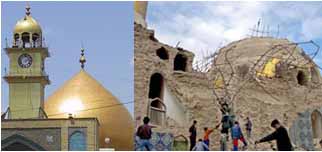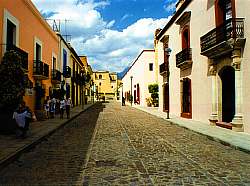|
 These three poems are taken from
These three poems are taken from
The Resurrection of the Body
(Smith/Doorstop and Sheep Meadow, 2007)
John Ashbery wrote: 'Vibrant, radiant, Michael Schmidt’s poetry is steeped in modernist tradition (Yeats and Eliot) and questingly new. The result is a passionate discourse that is at once earthy and numinous, from which “flows that unusual grace which is rooted in muscle, / Which comes from the marrow and lymph, which is divine . . .” '
The Golden Dome
22 February 2006
I was there once, oh, forty years ago.
The map does it no justice: the river’s sluggish,
Forgetful; the ruins of the great
City of Samarra are drab and crusted, but what you see
From miles off approaching is the dome, the golden
Dome, rising above the Tigris like a moon…
Among the elaborate geometries that praised
The Merciful, the Compassionate (in His name),
Not far from the spiral minaret that screws the earth
Right into heaven so the muezzin’s voice,
Even as men can hear it, talks to God,
Al-Mutawakkil set a rectangle (measured it out,
Being a tall man, pacing as a king,
His servants and architects drawn in his wake)
Two hundred forty deep, a hundred sixty
Wide. His slaves began to build
Fortress-thick walls with bricks of clay
Washed by the Tigris, hardened in the sun,
Ribbed the structure with forty four stalwart towers
Until it rose higher than the highest house,
Even than the highest house of God.
Within, the blue and gold arcade was exquisite,
With tracery and the words the Prophet said
Woven, inwoven like a choir of birds.
Eloquent especially were the arches facing Mecca.
Compassion, Mercy had an open gate there.
Malwiya was the mosque’s own minaret:
If Al-Mutawakkil paced his way to heaven
Malwiya was the first phase of his journey,
Fifty-two paces up into the sky. When it was done
It was the great mosque of Islam. Samarra.
‘Not briefly the Abassids were approved by heaven.’
It grew, it was remembered and forgotten.
Nasr al-Din Shah, so God would see him,
And re-bless Samarra with His ancient favour,
Gave the gold dome, though not in Nasr’s lifetime
Did its hemisphere crescent the horizon.
A century ago, under Muzaffar al-Din Shah
It was done: gold on the outside, inside
It was just like a blue night sky, a replica
Of heaven itself. Man honoured God by making
A second home for him.
At each corner, the square,
Bearing the tonnes of dome -- clay, tile and gold --
Hosted ornate and very holy graves,
Of Imam Ali al-Naqi (the tenth, peace to him),
His son Hasan al-Askari (the eleventh, peace),
Hakimah Khatoon, Ali’s dearest sister,
And finally the grave of fair Nargis Khatoon,
Mother of Imam al-Mahdi (peace on them all).
Those were the great men, caliph, builder, imams,
The great men and their shadows, mother, sister.
Of the brick makers and slaves there is no record
Except the thing they did, which was well done.
It is the hour of morning prayer.
The square is full of white doves, pouting, preening,
And men with low-arched feet, the poor believers,
The ones who carry God on their bent shoulders
And kneel and touch their foreheads to the ground
And empty out their purses when they go,
All dressed in white too like the plump amorous doves.
As they are praying, murmuring, standing, bowing,
Their eyes fixed towards Mecca and the truth,
They do not sense concealed behind the ornate tombs
Four brothers equal in their other faith.
They do not see the signal, suddenly
The dead Imams (peace to them) and their shadows
Burst from their stone in splinters, heaven falls
In great gouts of lapis, clay and gold
And as when Samson regrew his hair
And rattled the columns, down the temple fell.
Among the sirens and the modern sounds
The shadows come, shadows in their black gowns,
Veiled, but their veils awry and wet with weeping,
The shadows gather and their eyes are red,
Their wailing louder than the circling copters.
Out of those shadows came the caliphs once,
And come the little warriors, the brick-makers and builders,
Out of the shadows come calligraphers
Who write the names of God in tile and gold,
Out of them come the mystics and the Imams,
And lovers, and more shadows like themselves, too,
Some beautiful like Hakimah and Nargis.
The martyrs gloat together as they rise
Past Malwiya and gazing down observe
The gibbous wreck, the great dome broke,
Dust in a plume and a cloud and a haze then settling.
Around the wreck a swarm; as they go higher
Samarra is an anthill, though they hear
Even as they pass into Paradise
The wailing shadows, so like the ones they left
Wherever it is they came from and are gone;
And since their men are dead, the shadows
Here and there, wherever, having spent
Their generations in giving, take flesh, become.
.
|
|

'His father was a baker . . .’
for A.G.G.
His father was a baker, he the youngest son.
I understand they beat him, and they loved him.
His father was a baker in Oaxaca:
I understand his bakery was the best
And his three sons and all his daughters helped
As children with the baking and the pigs.
I can imagine chickens in their patio,
At Christmastime a wattled turkey-cock, a dog
Weathered like a wash-board, yellow-eyed,
That no one stroked, but ate the scraps of bread
And yapped to earn his keep. I understand
The family prospered though the father drank
And now the second brother follows suit.
I understand as well that love came
Early, bladed, and then went away
And came again in other forms, some foreign,
And took him by the heart away from home.
His father was a baker in Oaxaca
And here I smell the loaves that rose in ovens
Throughout a childhood not yet quite complete
And smell the fragrance of his jet-black hair,
Taste his sweet dialect that is mine too,
Until I understand I am to be a baker,
Up before dawn with trays and trays of dough
To feed him this day, next day and for ever --
Or for a time -- the honey-coloured loaves.
|



